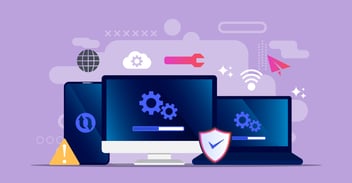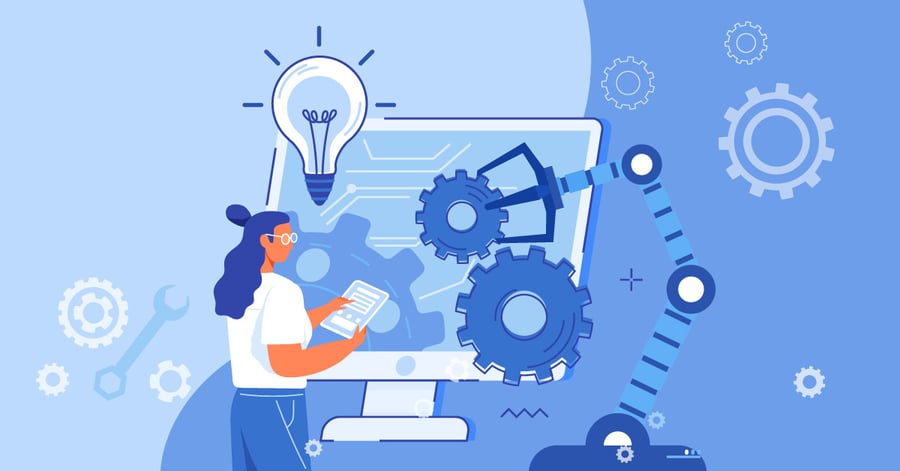
Automate Business Processes: Transform Your Business with Robust ERP Software
Published :

Enterprise Resource Planning software, a core software that powers large businesses has reached an important tipping point. The core ERP solutions market is expected to grow by leaps and bounds in the coming times. This transition from running important applications like human resources, accounting and materials management ‘on-premises’ to flexible cloud-based ERP on cloud suites facilitating innovation has lately become an IT imperative.
With this transition, public cloud computing may soon become the default model for medium and large-sized businesses. This is a noteworthy turnaround for an IT model which was viewed with suspicion and considered risky and insecure for the prime time a few years back. Currently, cloud services are being considered more secure than corporate data centers and less prone to cyberattacks.
This remarkable shift to ERP on cloud software is taking place in the backdrop of a broader shift to cloud-based IT subscription services and cloud computing in the enterprise and consumer IT markets. This represents itself as more than just a technology transition. Unlike previous transitions, the shift to enterprise cloud computing is not driven by IT, rather by the business owners who feel the need to innovate and stay ahead in the competition.
Small and midsize businesses are playing a pivotal role in flipping on-premises ERP solutions to the cloud as they are aiming to standardize business processes and streamline IT functions. Now, subsidiaries and divisions of major enterprises and larger mid-size companies are beginning to follow the suit. Moreover, they are showing the willingness to adopt cloud-based financial management applications for the very first time.
There are numerous reasons for businesses to make the shift to ERP on cloud software today. Most importantly, it is not about costs or technology, rather, it is about devising an effective business strategy and ensuring that businesses can innovate and compete in the digital future.
However, a few companies are still dependent on old ‘legacy’ software – a few of them may be decades old. Oftentimes, these legacy software are running on out-of-date and old hardware that are no longer supported. Additionally, they have been highly customized and cobbled together following acquisitions and lack documentation. This customization has further led to technical complexities.
Worst of all, these old apps and software are often challenging or impossible to modify, constraining business operations and stifling innovation. And, since most of the software vendors have shifted their efficient developers to work on their cloud apps, on-premises legacy apps are falling behind their cloud-based counterparts.
Ideally, the legacy applications were built for maintaining records. While these applications still function fine, their designs are outdated. It is difficult, though not impossible to retrofit old applications to compete in the digital business environment with the help of ERP solutions
Importantly, digital transformation and the transition to cloud-based ERP software will unleash a wave of innovation. It will disrupt old business models and change the role of IT departments and CIO’s function in the enterprises. This is where ERP solutions come into play.
Digital is the new engine of the industries, and the winning enterprises will be those that will harness digitization for driving revenues. However, the companies dependent on legacy ERP applications will not be able to compete in the competitive digital economy and will eventually wither and die.
Innovators have already illustrated the potential of digital technologies such as cloud-based ERP software, inclusive of asset management software to disrupt industries. In the process, they have had an earnest impact on the consumers. Now, it’s time for other business leaders to contemplate what is happening in their business, and act on that particular insight in real-time.
An agile ERP software offers a multitude of benefits such as enhanced security, automated business processes, stronger inter-department communication, real-time reporting, scalable and organized cloud-based data, and a complete integration solution.
Besides high-performing ERP software, Ramco offers complementary modules built on a common platform for finance and accounting, supply chain management, project management, quality management, enterprise asset management and others.
So, now is the time to automate your business processes with the best ERP software to increase the overall efficiency of your organization and make it a smarter workplace.
Enterprise asset management (EAM) involves the management of mission critical assets of an organization throughout each asset's lifecycle. EAM is used to plan, optimize, execute, and track the needed maintenance activities with the associated priorities, skills, materials, tools, and information. The aim is to optimize the quality and utilization of assets throughout their lifecycle, increase productive uptime and reduce operational costs.
Enterprise asset management (EAM) involves the management of the maintenance of physical assets of an organization throughout each asset's lifecycle. EAM is used to plan, optimize, execute, and track the needed maintenance activities with the associated priorities, skills, materials, tools, and information.
The software helps in effective maintenance of assets through preventive, predictive, shutdown and breakdown maintenance strategies. The system also helps enterprises mitigate equipment risks by enhanced safety standards. The streamlined operations and improved asset performance helps organizations increase their investment effectiveness.
EAM is important because it helps organizations track, assess, manage and optimize asset quality and reliability. Asset intensive Organizations have hundreds, thousands, even millions of assets which needs to be maintained to maximize / optimize life of these assets to increase the return on investment.
The key features of effective EAM are:
Asset Intensive companies under the following Industries :
Contact us for a meeting and schedule a demo
This differs on case to case basis, based on the type of installation and unique industry specific requirements. Contact us for a meeting and schedule a demo.
This differs on case to case basis, based on the type of installation and unique industry specific requirements. Contact us for a meeting and schedule a demo.
Stay Connected, follow us on LinkedIn / Twitter to know more about EAM Software latest trends.

Karthikeyan leads the Product Marketing for Enterprise Digital Solutions at Ramco Systems.He is an astute technology marketer with over 12 years of experience across the spectrum from products to services and product management. He follows technology trends ardently and the impact they have on businesses. He has formulated successful go-to-market strategies for manufacturing and other asset-intensive sectors – the likes of automotive, textiles, cement and heavy industries. Outside of work, you can catch him spending time playing Tennis, Badminton and going on Road Trips.

All Rights Reserved. © Copyright 2024. Ramco Systems.